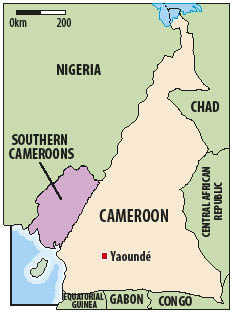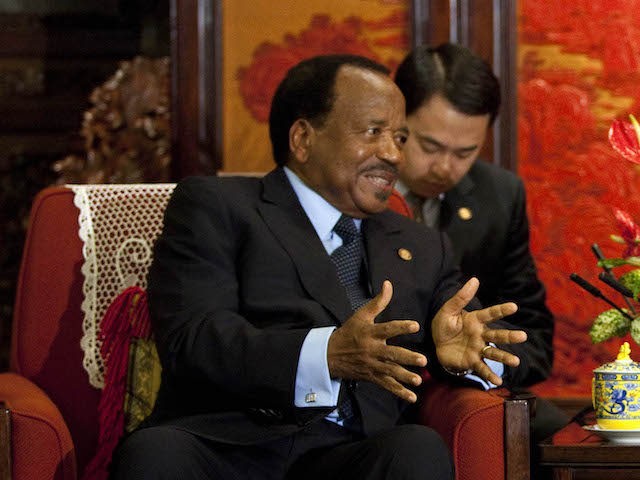This morning’s key headlines from GenerationalDynamics.com
- Cameroon: One person killed in English-speaking vs French-speaking civil unrest
- Activists call for independence of English-speaking Cameroon
Cameroon: One person killed in English-speaking vs French-speaking civil unrest

Protests in Bamenda on Monday (RFI)
Reports indicate that there was at least one death on Monday in clashes between English-speaking (Anglophone) protesters and police, during protests of discrimination and marginalization by the French-speaking (Francophone) majority.
Thousands of Anglophone Cameroonians brought coffins to protests to the city of Bamenda, proclaiming that they were ready to die and be burned in their coffins. Security forces fired tear gas and live bullets to disperse the demonstrators. The amount of violence has been a surprise, causing some to worry of a government crackdown leading to genocide. The 1994 Rwanda genocide is in the minds of the Cameroon people, as it is in the minds of all Africans.
Monday’s demonstrations were by Anglophone teachers who were protesting that the government was deploying Francophone teachers teach the French language in Anglophone areas of Cameroon.
The teachers’ demonstrations followed demonstrations by Anglophone lawyers in Bamenda two weeks ago to protest that the legal and court systems are biased toward Francophones, with many laws passed without even being translated into English. That demonstration was dispersed by security forces using tear gas. Cameroon Concord and Radio France Internationale (RFI) and International Business Times (London)
Activists call for independence of English-speaking Cameroon

Cameroon, highlighting the English-speaking Southern Cameroons (Nebafuh)
In the 15th century, Portuguese explorers named the area near the mouth of the Wouri River the Rio dos Camaroes (River of Prawns) after the abundant shrimp in the water. Over time the designation became Cameroon in English. This is the only instance where a country is named afer a crustacean.
During the “Scramble for Africa” in the late 1800s, Cameroon became a colony of Germany. However, during World War I, Britain and France forced Germany out of the territory, and created two regions, British Cameroon and French Cameroon.
The war for independence began in 1955 in French Cameroon. Independence was won in 1960, with the Republic of Cameroon.
In 1961 British Cameroon, under a referendum sponsored by the United Nations, was given the choice of joining either Nigeria or the Republic of Cameroon. There was a split with the Northern part of British Cameroon voting to join Nigeria, and the Southern part voting to join the French speaking Cameroon. Overall, the latter won the referendum. The former British Cameroon is now known as the “Southern Cameroons” region of Cameroon, and is home to about 3.2 million English-speaking people. This month’s riots and demonstrations took place in Bamenda, a city of 500,000, and the largest city in Southern Cameroons.
During the generational Awakening era that followed, a separatist movement called the Cameroon Anglophone Movement began in 1984. The Southern Cameroons region is adjacent to the Biafra region of Nigeria, and some activists would like to join the two into an independent country. Of course, this is opposed by both the Cameroon and Nigeria governments. International Business Times (27-Feb-2016) and Jacob Crawfurd (Copenhagen) and Nebafuh (activist) and CIA World Factbook
Related Articles
KEYS: Generational Dynamics, Cameroon, Bamenda, Rio dos Camaroes, British Cameroon, French Cameroon, Southern Cameroons, Nigeria, Biafra
Permanent web link to this article
Receive daily World View columns by e-mail

COMMENTS
Please let us know if you're having issues with commenting.